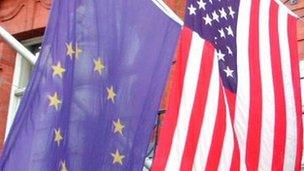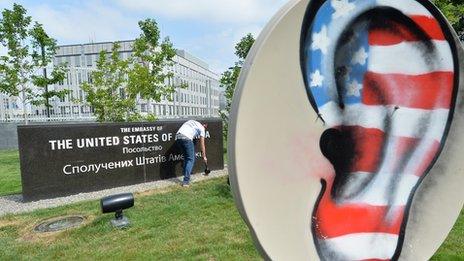Snowden leaks: Snooping on friends morally questionable
- Published
- comments

Spying on China's military is one thing - but snooping on your mates ahead of trade talks is another
The diplomatic fallout from the spying leaks continues. Snowden snowballs, if you like, external.
The latest is that the French are calling for a temporary delay in important US-EU trade talks, after reports America spied on EU officials.
According Le Monde, external, the French government's spokesman Najat Vallaud-Belkacem says they don't want to stop the negotiations. But they do want to suspend them for 15 days to give time to get more details.
It is a gesture and probably won't happen - the free trade talks are seen as a big prize, worth 157bn euros (£133bn) to the European economy and $125bn to America. The Germans and the EU commission want the talks to go ahead. So they probably will. But no one is happy.
The French strop is more than a fit of pique - it raises important questions.
I suspect most people accept that it is the intelligence services' job to spy on potential terrorists.
Many would accept they will try to uncover the military secrets of countries like Russia and China.
But snooping on friends to find out their negotiating positions?
It certainly is in the nation's interest - it gives your country an advantage, just as industrial espionage helps companies. Just as looking at your poker buddies' cards helps your game. Just as listening in to your friend's phone might give you a greater insight into his life.
But all these examples are morally, if not legally, questionable.
Perhaps not quite the same as ordering a break-in to spy on a rival political party. This isn't an international Watergate. Not quite. But it is a fair way down a sliding scale.
It will create disquiet among allies who may feel the US has learnt no lessons from the recent past. They may feel the most powerful country in the world always does whatever it wants, sees no boundaries to its behaviour, and is not to be trusted.
- Published2 July 2013

- Published2 July 2013
- Published1 July 2013
